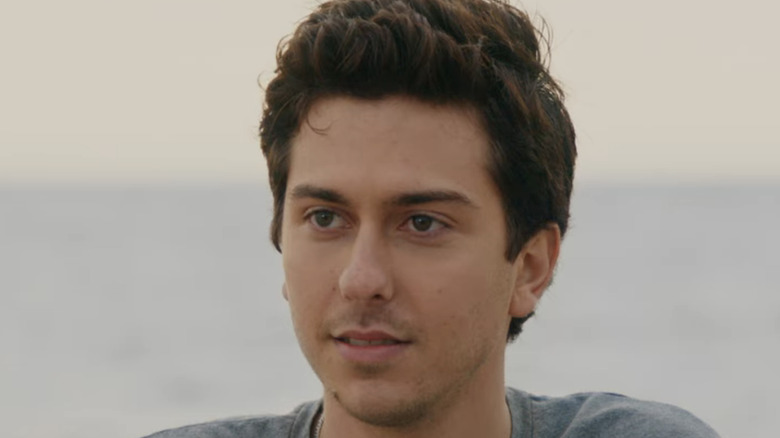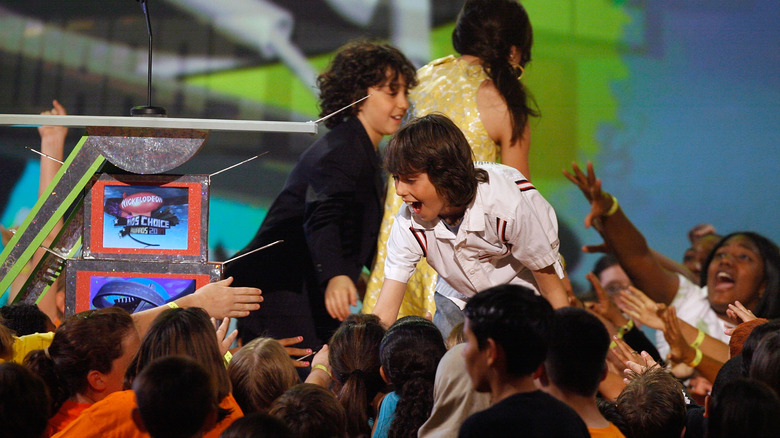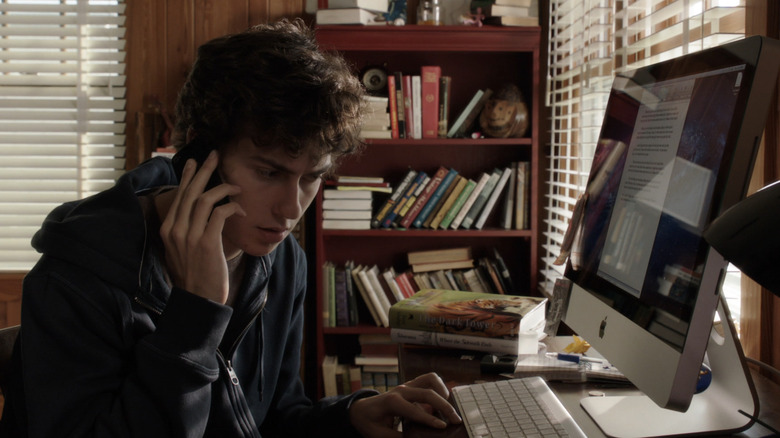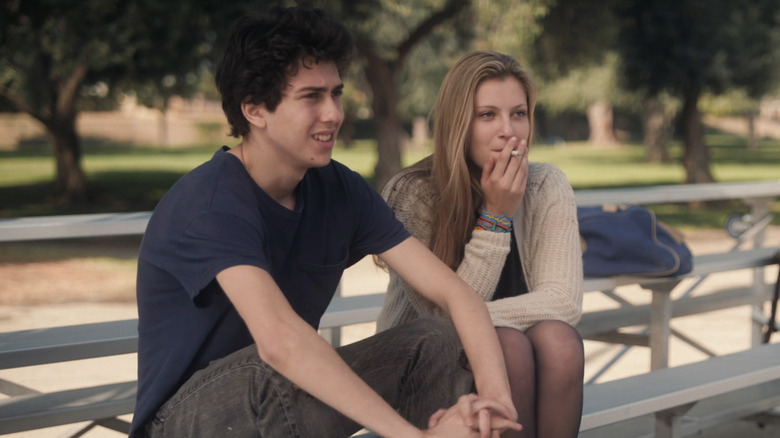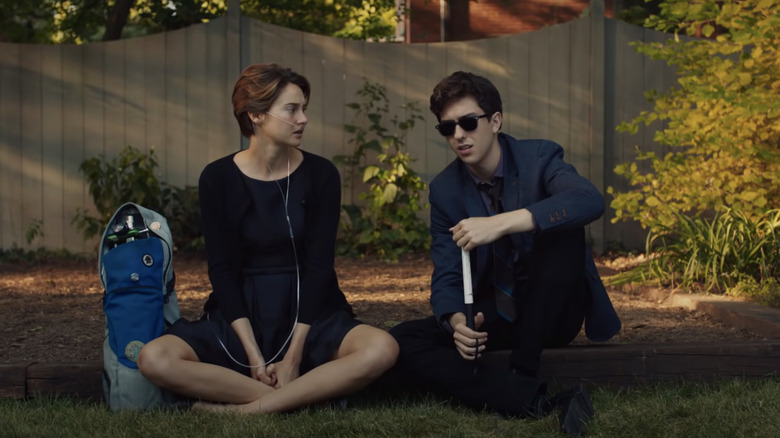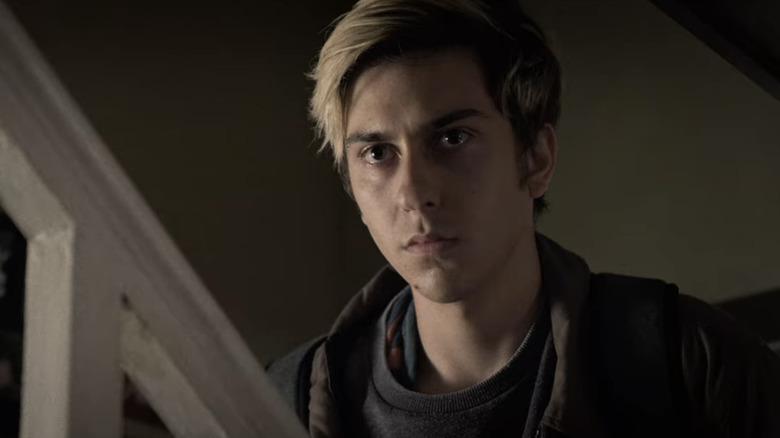Why Teddy From Home Again Looks So Familiar
Reese Witherspoon is one of the most well-known actresses working today, and her name has become synonymous with romantic comedies like "Legally Blonde" and "Sweet Home Alabama." One of her forgotten rom-coms is the 2017 film "Home Again." Witherspoon stars as Alice Kinney, a 40-year-old mother of two who's separated from her husband, Austen (Michael Sheen). While out getting drinks with friends, Alice meets three young men named Harry Dorsey (Pico Alexander), George (Jon Rudnitsky), and Teddy Dorsey (Nat Wolff), who are aspiring filmmakers. Since Alice's mother happens to be a distinguished filmmaker, the three guys quickly become acquainted with Alice and her family, and she embarks on a potential romantic relationship with Harry once they realize they have undeniable chemistry.
"Home Again" is a lighthearted film about growing up and figuring out who you are, and its starring cast helps to make it a memorable watch. The actor of the filmmaking trio, Teddy, is played by Nat Wolff, who you likely recognize from one of the many films he's been in through the years. Here's where you may have seen him before.
He started as a rock 'n' roll kid
For those who were kids during the mid-2000s, you may have had the pleasure of hearing the iconic music group The Naked Brothers Band — NBB for short. The NBB was made up of Nat Wolff, the lead singer; his brother Alex, who played drums; bassist Allie DiMeco; Qaasim Middleton, the guitarist; Thomas Batuello on the cello; keyboardist David Levi; and Cooper Pillot, who was the manager. The band was at the center of a mockumentary-style movie that was turned into a Nickelodeon TV show. Both were written and produced by none other than Polly Draper, Nat and Alex's mom.
Draper told TV Guide how the conception of The NBB came about, revealing, "None of this was calculated at all on any of our parts. What originally happened was that Nat and Alex had a band, and the idea evolved based on that. 'Spinal Tap' meets 'The Little Rascals' was my concept. Nat and Alex are just obsessed with The Beatles — Alex learned to play drums because he watched Ringo [Starr] play — so we had to pretend to be The Beatles when they were little ... That was another thing that featured into my style, that I wanted it to be very Beatle-ish, have that 'Help!' or 'A Hard Day's Night' kind of feeling."
Though The NBB didn't last long, it made a lasting impact, and Nat and Alex continue to star in movies and television shows to this day.
He was Stuck in Love
In 2012, Nat Wolff starred in one of his first romantic comedies, titled "Stuck in Love." He played a high-schooler named Rusty Borgens, the son of a successful novelist named Bill (Greg Kinnear) and his ex-wife Erica (Jennifer Connelly). The bulk of Rusty's storyline focused on his crush on a troubled classmate named Kate (Liana Liberato) as well as his desire to embark on his own writing career. In an interview with The Hollywood Reporter, Wolff revealed that it was actually Liberato who helped set him up for the part. Since she was already cast in the film, she told Wolff he would be perfect for the role of Rusty and sent him the script. Wolff said he related to the family's shared obsession over the arts, though his real-life family is focused on music rather than writing.
"For my character, it was so well written," Wolff explained to Film Festival Traveler. "I didn't realize that he was based on [director Josh Boone] when he was younger but it makes sense because it's so honest. I come from a family of musicians and actors and that creates a household of people who like to talk about the same thing and it ends up with a lot of conflict that comes out of that. In this movie, it's about people who are really obsessed with the same thing which makes it easy to relate to but also difficult in some ways."
He was in Palo Alto
Wolff played the role of the troubled stoner Fred in the 2013 drama "Palo Alto," based on James Franco's collection of short stories by the same name. The film was a stark contrast compared to his role in "Stuck in Love" — where Rusty was kind and sensitive, Fred is manipulative and just not that great of a guy. Despite Fred's awful decisions and disturbing behavior, Wolff managed to make him more likable than one may want to admit — The Atlantic's Esther Zuckerman suggested that Wolff's performance is almost alluring.
"Gia [Coppola, the director] told me, I want you to find the fun and the humor and the lightness," Wolff explained to Zuckerman. "The a**hole's already in the script. You don't have to play the a**hole. Play the other. That opened me up." Wolff was nominated for an International Online Cinema Award for Best Supporting Actor for his portrayal of Fred, so it looks like he was able to master the art of diluting his character's horrible-ness.
He starred in two John Green films
One of the biggest movies of 2014 was the heartbreaking coming-of-age film "The Fault in Our Stars," based on the hugely popular John Green novel by the same name. "The Fault in Our Stars" tells the devastating yet touching love story of two teenagers, Hazel Grace Lancaster (Shailene Woodley) and Augustus Waters (Ansel Elgort), who meet at a cancer patient support group. Nat Wolff played Gus' best friend named Isaac, who is a cancer patient as well.
Wolff spoke to THR about playing Isaac, who went blind by the end of the film due to his cancer. "This is probably the hardest character I've played because it seems so simple, he explained. "How am I gonna make it so he's a super-funny character who's not the butt of the joke? I met with a lot of blind people, and they said, they're very offended by [portrayals of blind people onscreen] — people who are walking into stuff, making fun of them. So what I tried to do was find the edge behind the humor."
Wolff was ultimately praised for his portrayal of Isaac and went on to star in another John Green movie adaptation titled "Paper Towns" shortly after. He shared his excitement with Vanity Fair, gushing, "How cool is that? I get to play the lead in the movie. It's about this kid who falls in love with this girl ... she and him go on this long adventure at night. It's really romantic. And then in the morning, she disappears and he goes on this hunt to find her. It's kind of a mystery romance ... [John Green] told me on set that I should read his book Paper Towns ... I read it ... and then they called me and asked me if I wanted to be the lead. It also reaffirmed to me that I must have been good in 'Fault.'"
He was in a controversial manga adaptation
While Nat Wolff has been in several romantic comedies and dramas, he's also ventured into other genres like thrillers — though unfortunately, one was quite controversial. The 2017 supernatural thriller "Death Note" was loosely based on the Japanese manga by the same name, and some critics weren't happy that Wolff, a white male, was playing the lead, which was originally written as Japanese.
Hanh Nguyen of Indie Wire wrote: "This story, like many taken from the most popular anime or manga, has cultural significance to Japan. For example, 'Akira' is about post-war Japan, even though it's set in 'Neo Tokyo' ... Setting the story [of 'Death Note'] in Seattle and not having anyone Asian American play the role of Light Yagami, now Light Turner, removed that context."
On the other hand, the creators behind the original "Death Note" had positive things to say about the adaptation. Illustrator Takeshi Obata released a statement that read, "the movie is [a] magnificent A-level thriller masterpiece. The characters are all faithful to satisfying their desires. I've always wanted to write a 'Death Note' like this, as well. Through Netflix, it will reach a global audience, so I hope that the people around the world who didn't know about Death Note will get a chance to discover and enjoy it," via Cinema Blend.
"It exceeded my expectations," said original writer Tsugumi Oba, via Cinema Blend. "There was [a] high level of quality, sophistication, and attention to every detail. This is what a Hollywood 'Death Note' movie should be. Personally, I was engrossed with the ending!"
Wolff and the "Death Note" producer Roy Lee commented on the whitewashing, noting that the movie is a very loose adaptation of the manga and didn't intend to portray white actors as Japanese people. Nonetheless, it serves as a good example of issues with representation in Hollywood.
